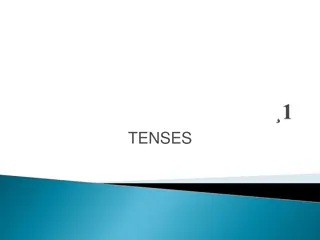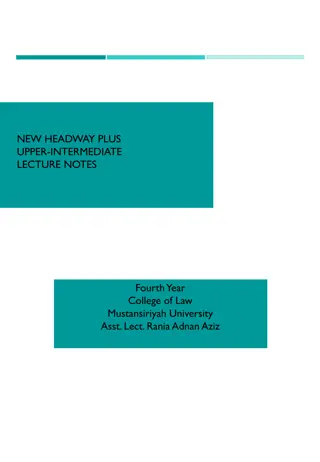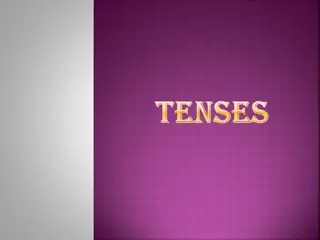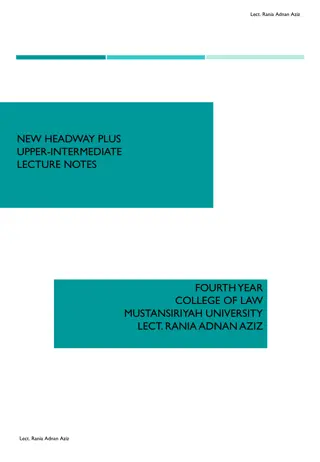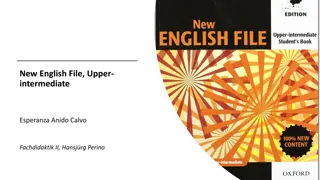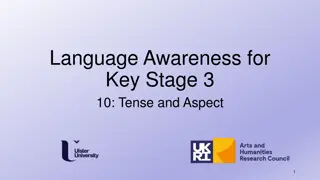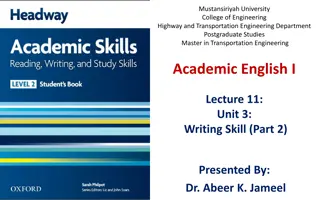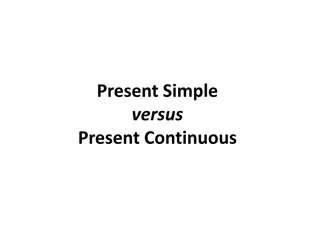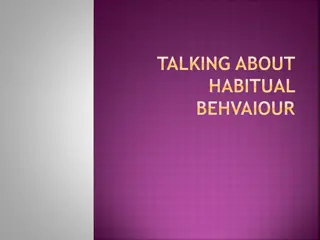Understanding English Tenses: Simple Present and Sentence Structure
Explore the Simple Present tense in English, learn how to form affirmative, negative, and question sentences, understand signal words, and discover the usage of long forms and contracted forms. Enhance your knowledge of using affirmatives, pronouns, modals, and sentence structures in English. Improve your grasp on fundamental English grammar concepts through detailed explanations and examples.
Download Presentation

Please find below an Image/Link to download the presentation.
The content on the website is provided AS IS for your information and personal use only. It may not be sold, licensed, or shared on other websites without obtaining consent from the author. Download presentation by click this link. If you encounter any issues during the download, it is possible that the publisher has removed the file from their server.
E N D
Presentation Transcript
Simple Present Tense Simple Present repeated actions My friend often draws sretsop ecin Use of the . .. . ..things in general The sun rises tsae eht ni . .fixed arrangements, scheduled events The plane flies yadnoM yreve nodnoL ot . .sequence of actions in the present First I get I neht ,pu have tsafkaerb . .instructions Open egap ta skoob ruoy . .with special verbs I understandhsilgnE .
. Signal words every day often always sometimes Never Form infinitive ( 3 rd person singular he, she, it :infinitive 4 . Examples 4.1 . Affirmative sentences in the Simple Present 4.2 . Negative sentences in the Simple Present You must not negate a full verb in English.Always use the auxiliary do snoitagen rof eht dnainfinitive brev eht fo . 4.3 . Questions in the Simple Present You need the auxiliary do/does eht dna infinitive brev eht fo - s ( + .
Long forms Contracted forms Do I play football? Do you play football? not possible Does he play football?
brev niam a sa be . Affirmative sentence Pronouns Negative sentence Question I am not from Britain. I I am from Britain. Am I from Britain? You are from Britain. You are not from Britain. Are you from Britain? you He is not from Britain. he, she, it He is from Britain. Is he from Britain? They are from Britain. They are not from Britain. Are they from Britain? we, you, they
brev niam a sa do 2 . Affirmative sentence Pronouns Negative sentence Question I do not do exercis es. I I do exercises. Do I do exercises? You do not do exer cises. Do you do exercise s? you You do exercises. He does not do ex ercises. Does he do exercis es? he, she, it He does exercises. They do not do ex ercises. Do they do exercis es? we, you, they They do exercises.
brev niam a sa have . Affirmative sentence Pronouns Negative sentence Question I do not have book s. I I have books. Do I have books? You do not have b ooks. you You have books. Do you have books? He does not have books. he, she, it He has books. Does he have books? They do not have books. we, you, they They have books. Do they have books?
cte . will , need , must , may , could , Modals can 4 . We can subtitute don't( can't rof )do not( cannot ) . Modals have the same form every time regardless the subject. We do not add an -s to the infinitive. Affirmative sentence Pronouns Negative sentence Question I, he, she, it, we, you, they I cannot play tenni s. I can play tennis. Can I play tennis?






